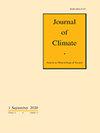Seasonal reversal of ENSO impacts on SST in the East China Sea-Kuroshio region
IF 4.8
2区 地球科学
Q1 METEOROLOGY & ATMOSPHERIC SCIENCES
引用次数: 0
Abstract
Abstract Sea surface temperature (SST) variability in the East China Sea-Kuroshio (EK) region has important implications for the surrounding weather, climate, and marine ecology. The year-to-year variations of the EK SST are expectedly linked to the El Niño-Southern Oscillation (ENSO), the predominant predictability source of seasonal-to-interannual climate variability. Surprisingly, no significant SST signal is observed in the EK region when focusing on the ENSO autumn-winter season with the persistent and pronounced SST anomalies in the tropical Pacific. We find that a remarkable seasonal reversal appears in the ENSO-EK SST connection, shifting from a negative relationship in autumn (Aug(0)-Oct(0)) to a positive relationship in winter (Dec(0)-Feb(1)). This reversal is mainly attributed to the seasonally varying ENSO-associated Western North Pacific (WNP) atmospheric circulation patterns. During ENSO autumns, the anomalous WNP anticyclone is confined south of 20°N, which is accompanied with cyclonic circulation anomalies in the EK region. The associated anomalous northerly wind tends to enhance the background northerly wind, thereby facilitating the local SST cooling mainly via the wind-evaporation-SST effect. In the subsequent winter, the ENSO-related WNP anticyclonic anomalies intensify and extend toward the EK region. Consequently, the weakened background northerly wind induced by southerly wind anomalies, leads to the increase of downward latent and sensible heat flux in the EK region, fostering the local SST warming. The observed seasonal reversal of ENSO impacts can be evidenced by the tropical Pacific pacemaker experiments, emphasizing the importance of seasonally modulated ENSO teleconnection and holding implications for the local SST climate prediction.厄尔尼诺/南方涛动对东海-黑潮地区海温影响的季节性逆转
摘要 中国东海-黑潮(EK)区域的海面温度(SST)变化对周围的天气、气候和海洋生态具有重要影响。东海-黑潮海面温度的逐年变化预计与厄尔尼诺-南方涛动(ENSO)有关,ENSO 是季节性到年际性气候变异的主要预测源。令人惊讶的是,当关注厄尔尼诺-南方涛动秋冬季节与热带太平洋持续明显的 SST 异常时,在 EK 地区没有观察到明显的 SST 信号。我们发现,ENSO-EK SST 关系出现了明显的季节性逆转,从秋季(8 月(0)-10 月(0))的负相关关系转变为冬季(12 月(0)-2 月(1))的正相关关系。这种逆转主要归因于与厄尔尼诺/南方涛动有关的季节性变化的西北太平洋(WNP)大气环流模式。在 ENSO 秋季,异常的 WNP 反气旋被限制在 20°N 以南,同时伴随着 EK 地区的气旋环流异常。与之相关的异常北风往往会增强背景北风,从而主要通过风-蒸发-SST 效应促进局地 SST 冷却。在随后的冬季,与厄尔尼诺/南方涛动相关的 WNP 反气旋异常增强并向东九龙地区延伸。因此,南风异常引起的背景北风减弱,导致东九龙地区向下的潜热通量和显热通量增加,促进了当地的海温升高。热带太平洋起搏器实验证明了观测到的厄尔尼诺/南方涛动影响的季节逆转,强调了季节调制厄尔尼诺/南方涛动远缘联系的重要性,并对当地的海温气候预测产生了影响。
本文章由计算机程序翻译,如有差异,请以英文原文为准。
求助全文
约1分钟内获得全文
求助全文
来源期刊

Journal of Climate
地学-气象与大气科学
CiteScore
9.30
自引率
14.30%
发文量
490
审稿时长
7.5 months
期刊介绍:
The Journal of Climate (JCLI) (ISSN: 0894-8755; eISSN: 1520-0442) publishes research that advances basic understanding of the dynamics and physics of the climate system on large spatial scales, including variability of the atmosphere, oceans, land surface, and cryosphere; past, present, and projected future changes in the climate system; and climate simulation and prediction.
 求助内容:
求助内容: 应助结果提醒方式:
应助结果提醒方式:


